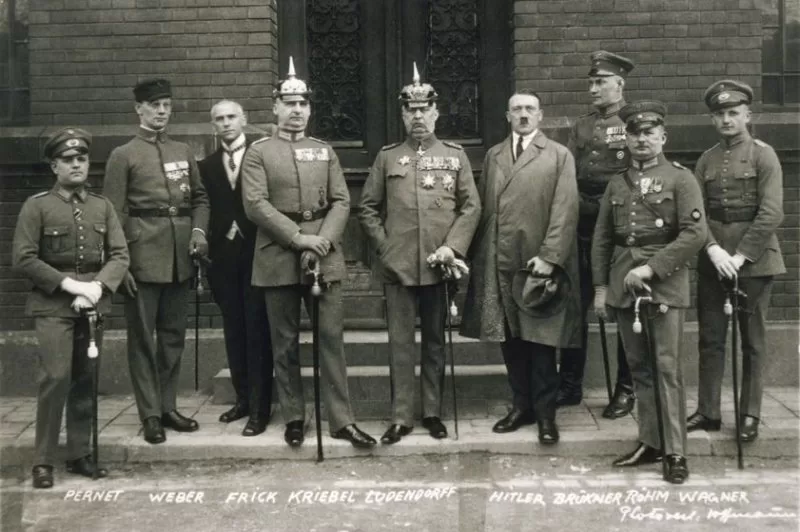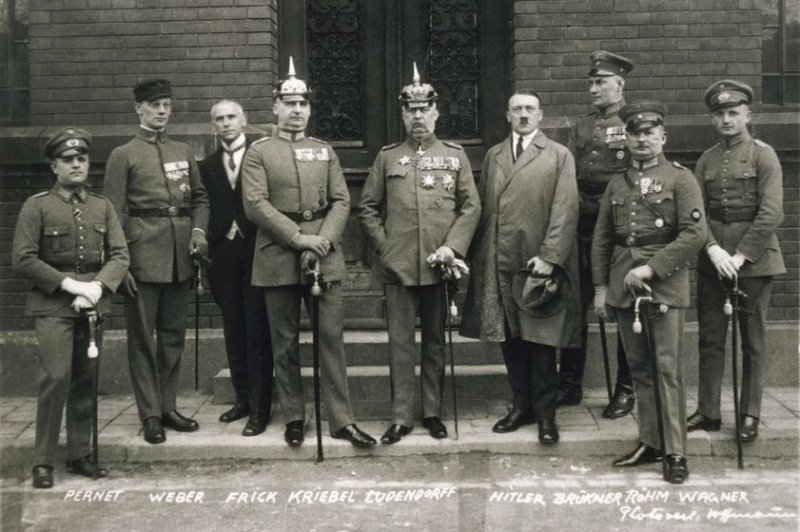April 1 (UPI) — On this date in history:
In 1826, Samuel Morey was granted a patent on the internal combustion engine.


1 of 6 | The defendants in the Beer Hall Putsch trial pose for a photo in Munich, Germany, on the last day of the trial, April 1, 1924. From left are Heinz Pernet, Friedrich Weber, Wilhelm Frick, Hermann Kriebel, Erich Ludendorff, Adolf Hitler, Wilhelm Brückner, Ernst Röhm and Robert Wagner.
April 1 (UPI) — On this date in history:
In 1826, Samuel Morey was granted a patent on the internal combustion engine.
In 1891, the Wrigley Company is founded in Chicago, Ill., by William Wrigley, Jr., originally selling goods such as soap and baking powder. A year later Wrigley would start packaging packets of gum with each tin of baking powder. The rest is history.
In 1918, toward the end of World War I, the British founded the Royal Air Force. Two months later it began bombing industrial targets in Germany from bases in France.

File Photo by Stephen Shaver/UPI
In 1924, Adolf Hitler was sent to prison for five years after failing to take over Germany by force in the unsuccessful “Beer Hall Putsch.”
In 1945, U.S. forces swarmed ashore on the Japanese island of Okinawa to begin what would be one of the longest battles of World War II.
In 1946, a massive earthquake near Alaska’s Aleutian Islands created a tsunami that raced south across the Pacific Ocean, slamming into the Hawaiian Islands causing widespread destruction. The two events resulted in more than 165 casualties across three states.
In 1970, President Richard Nixon signed legislation calling for mandatory health warnings on tobacco product packaging and banning cigarette ads on TV and radio, effective January 1, 1971.
In 1976, Apple Inc. was founded by Steve Jobs and Steve Wozniak.

UPI File Photo
In 1979, the overthrow of the shah becomes official as Iran votes to become an Islamic republic.
In 1984, Marvin Gaye, whose rhythm and blues hits over nearly 25 years included “I Heard it Through the Grapevine” and “Sexual Healing,” was shot and killed by his preacher father.
In 1992, U.S. President George H.W. Bush announced a $24 billion aid package for the former Soviet republics.
In 1996, an outbreak of “mad cow” disease forced Britain to plan the mass slaughter of cows.
In 1999, Canada created a new territory, Nunavut, as a means of providing autonomy for the Inuit people.
In 2003, U.S. Marines rescued Pfc. Jessica Lynch, 19, who had been held prisoner in Iraq since an ambush on March 23.
In 2012, Aung San Suu Kyi, Nobel peace laureate and voice of the political opposition in Myanmar, won a seat in Parliament less than two years after being freed from nearly two decades of house arrest.
In 2019, Japan announced the name of its new imperial era would be “Reiwa,” when Crown Prince Naruhito becomes emperor, which would happen one month later.
In 2021, a Hong Kong judge convicted seven pro-democracy protest leaders on charges of organizing and participating in an unlawful assembly during mass protests that rocked the former British colony in 2019.

File Photo by Jerome Favre/EPA-EFE